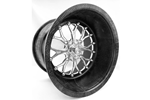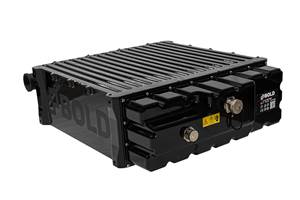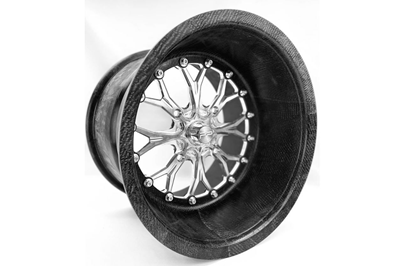Carbon Revolution meets automotive market demand with lightweight carbon fiber wheels
Twenty-three-inch and 24-inch carbon fiber wheel offerings meet growing EV SUV and truck load requirements with 45% weight savings comparable to aluminum wheels.
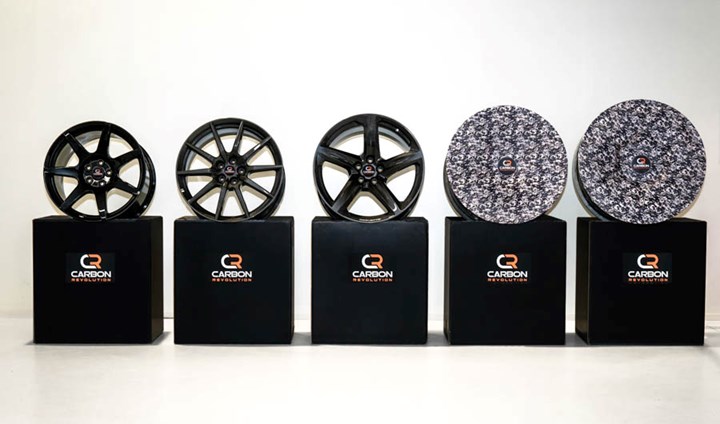
Carbon Revolution’s composite wheel product offerings, with upcoming releases (far right) to be disclosed. Photo Credit, all images: Carbon Revolution
According to Carbon Revolution (Geelong, Australia) consumer demand for even larger sport utility vehicle (SUV) and pickup truck wheels has driven OEMs to embrace carbon fiber, as traditional aluminum wheels become too heavy at required levels of durability and strength. Recently, the company has claimed development of the largest and lightest wheels on the market for these specific applications, following the company’s successful penetration of the performance and premium end of the market with four OEM carbon fiber wheel programs.
Carbon Revolution CEO, Jake Dingle, says the company is working with OEMs to provide uniquely styled wheels which meet strict quality and durability standards, in sizes rarely ever seen on production SUVs and pickups. “The demand for larger SUV and truck wheels is increasing, particularly with the move to electric vehicle [EV] platforms, and carbon fiber is really the only feasible way that bigger wheels can be delivered into these rapidly evolving and weight-sensitive categories,” Dingle believes. “The fact is that aluminum wheel technology has now maxed out when it comes to wheel size; they are just too heavy to be viable at these larger sizes.”
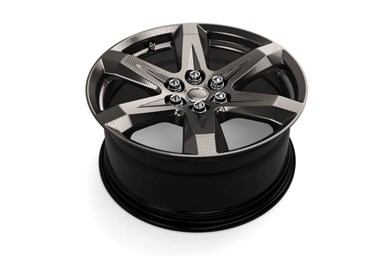
Render of a Carbon Revolution 26-inch one-piece carbon fiber wheel.
As soon-to-released EV variants add weight and power, further demand on wheel load requirements grow. “Carbon fiber is a highly sophisticated material that can be optimized to deliver the required levels of durability and strength, without a prohibitive increase in weight,” Dingle says. “Carbon Revolution’s technology can deliver the wheel strength and durability required for the rapidly emerging EV generation of SUVs and pickup trucks, and at the same time provide very meaningful range extension benefits by combing enormous weight savings with aerodynamic designs.”
Carbon Revolution has already developed and will soon be in full production with a 23-inch SUV wheel for a major global OEM, that is reported to be stronger, more durable and around 45% lighter than a comparable aluminum wheel.
“We are also well progressed with the development of 24-inch carbon fiber pickup truck wheels. These will also be around 45%-50% lighter than an equivalent aluminum wheel of that size,” he adds. “To put this into perspective, the 24-inch wheel we are developing for the new class of EV trucks will be lighter than an 18-inch alloy wheel but will have a load capacity in excess of 1,200 kilograms [2,600 pounds].”
Carbon Revolution engineering and design director, Dr. Ashley Denmead, says carbon fiber is the only material that could feasibly meet SUV and truck durability requirements in larger sizes.
“Carbon fiber wheels create new levels of opportunity for the vehicle system,” Dr. Denmead says. “Larger wheels can be realized for the equivalent weight of much smaller aluminum wheels while still enabling excellent durability and ride and handling characteristics. “At the same time, carbon fiber offers opportunities for design studios to create unique and distinctive aesthetics that simply aren’t possible to achieve in aluminum.”
Related Content
Plant tour: Airbus, Illescas, Spain
Airbus’ Illescas facility, featuring highly automated composites processes for the A350 lower wing cover and one-piece Section 19 fuselage barrels, works toward production ramp-ups and next-generation aircraft.
Read MoreAviation-specific battery system uses advanced composites to address electric, hybrid flight
BOLDair’s composite enclosure, compression structures and thermal runaway management enables high-performance electric energy storage.
Read MoreCutting 100 pounds, certification time for the X-59 nose cone
Swift Engineering used HyperX software to remove 100 pounds from 38-foot graphite/epoxy cored nose cone for X-59 supersonic aircraft.
Read MoreBladder-assisted compression molding derivative produces complex, autoclave-quality automotive parts
HP Composites’ AirPower technology enables high-rate CFRP roof production with 50% energy savings for the Maserati MC20.
Read MoreRead Next
Envisioning high-volume, 100% composite wheels
Vision Wheel debuted its first carbon fiber composite wheel at CAMX 2021, claiming its low-cost, high-volume process can be scaled up for performance vehicles, UTVs and — ultimately — passenger EVs.
Read MoreOribi Composites, Packard Performance partner for off-road powersports thermoplastic composite wheel
Composite UTV wheels are 50% lighter than aluminum and can handle extreme terrain and driving conditions.
Read MoreCutting 100 pounds, certification time for the X-59 nose cone
Swift Engineering used HyperX software to remove 100 pounds from 38-foot graphite/epoxy cored nose cone for X-59 supersonic aircraft.
Read More


